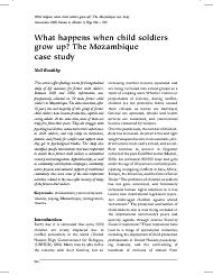What happens when child soldiers grow up? The Mozambique case study
This article offers findings on the first longitudinal study of life outcomes for former child soldiers. Between 1988 and 2004, information was prospectively collected on 39 male former child soldiers in Mozambique. The data show that, after 16years, the vast majority of this group of former child soldiers have become productive, capable and caring adults. At the same time, none of them are truly free from their pasts. They all struggle with psychological distress connected to their experiences as child soldiers, and rely solely on themselves, families andfriends for comfort and support when they get in psychological trouble. The study also identified specific interventions that were important to enable these former child soldiers a substantial recovery and reintegration. Apprenticeships, as well as community sensitization campaigns, community works projects and outward support of traditional community rites were some of the most important activities related to the successful recovery of many of theformer child soldiers. Keywords: child soldiers, community sensitization, coping, Mozambique, reintegration, trauma
Geachte bezoeker,
De informatie die u nu opvraagt, kan door psychotraumanet niet aan u worden getoond. Dit kan verschillende redenen hebben,
waarvan (bescherming van het) auteursrecht de meeste voorkomende is. Wanneer het mogelijk is om u door te verwijzen naar de bron
van deze informatie, dan ziet u hier onder een link naar die plek.
Als er geen link staat, kunt u contact opnemen met de bibliotheek,
die u verder op weg kan helpen.
Met vriendelijke groet,
Het psychotraumanet-team.
Reference:
Neil Boothby | 2006
In: Intervention: the international journal of mental health, psychosocial work and counselling in areas of armed conflict, ISSN 1571-8883 | 4 | 3 | 244-259
http://www.interventionjournal.com/sites/default/files/boothby.pdf
In: Intervention: the international journal of mental health, psychosocial work and counselling in areas of armed conflict, ISSN 1571-8883 | 4 | 3 | 244-259
http://www.interventionjournal.com/sites/default/files/boothby.pdf


